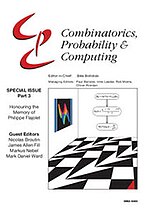Academic journal
 | |
| Discipline | Combinatorics, probability, theoretical computer science |
|---|---|
| Language | English |
| Edited by | Béla Bollobás |
| Publication details | |
| History | 1992–present |
| Publisher | Cambridge University Press |
| Frequency | Bimonthly |
| Open access | Delayed, after 6 months |
| Impact factor | 1.032 (2020) |
| Standard abbreviations ISO 4 (alt) · Bluebook (alt) NLM (alt) · MathSciNet (alt | |
| ISO 4 | Comb. Probab. Comput. |
| MathSciNet | Combin. Probab. Comput. |
| Indexing CODEN (alt · alt2) · JSTOR (alt) · LCCN (alt) MIAR · NLM (alt) · Scopus | |
| CODEN | CPCOFG |
| ISSN | 0963-5483 (print) 1469-2163 (web) |
| LCCN | 92660061 |
| OCLC no. | 26286529 |
| Links | |
Combinatorics, Probability and Computing is a peer-reviewed scientific journal in mathematics published by Cambridge University Press. Its editor-in-chief is Béla Bollobás (DPMMS and University of Memphis).
History
The journal was established by Bollobás in 1992. Fields Medalist Timothy Gowers calls it "a personal favourite" among combinatorics journals and writes that it "maintains a high standard".
Content
The journal covers combinatorics, probability theory, and theoretical computer science. Currently, it publishes six issues annually. As with other journals from the same publisher, it follows a hybrid green/gold open access policy, in which authors may either place copies of their papers in an institutional repository after a six-month embargo period, or pay an open access charge to make their papers free to read on the journal's website.
Abstracting and indexing
The journal is abstracted and indexed in:
- Compendex
- Computer Science Index
- Current Contents/Physical, Chemical & Earth Sciences
- Current Index to Statistics
- EBSCO databases
- Inspec
- MathSciNet
- ProQuest databases
- Referativnyi Zhurnal
- Science Citation Index Expanded
- Scopus
- Zentralblatt MATH
According to the Journal Citation Reports, the journal has a 2014 impact factor of 0.623. Since 2007, it has been ranked by SCImago Journal Rank as a first-quartile journal in four areas: applied mathematics, computational theory, statistics and probability, and theoretical computer science.
References
- "2019 Impact Factor". Journal Citation Reports. Clarivate Analytics. Retrieved 1 May 2020.
- Babai, L. (1996), "In and out of Hungary: Paul Erdős, his friends, and times", Combinatorics, Paul Erdős is eighty, Vol. 2 (Keszthely, 1993), Bolyai Soc. Math. Stud., vol. 2, János Bolyai Math. Soc., Budapest, pp. 7–95, MR 1395855. See in particular p. 21.
- Gowers, Timothy (29 January 2012), "What's wrong with electronic journals?", Gowers's Weblog: Mathematics related discussions, retrieved 8 September 2015.
- Official website

- ^ "Master Journal List". Intellectual Property & Science. Thomson Reuters. Archived from the original on 26 September 2017. Retrieved 10 September 2015.
- "Inspec list of journals" (PDF). Inspec. Institution of Engineering and Technology. Retrieved 10 September 2015.
- "Content overview". Scopus. Elsevier. Retrieved 10 September 2015.
- "Serials Database". Zentralblatt MATH. Springer Science+Business Media. Archived from the original on 7 November 2017. Retrieved 10 September 2015.
- "Combinatorics, Probability and Computing". 2014 Journal Citation Reports. Web of Science (Science ed.). Thomson Reuters. 2015.
- Combinatorics Probability and Computing journal report, SCImago Journal Rank, retrieved 8 September 2015.